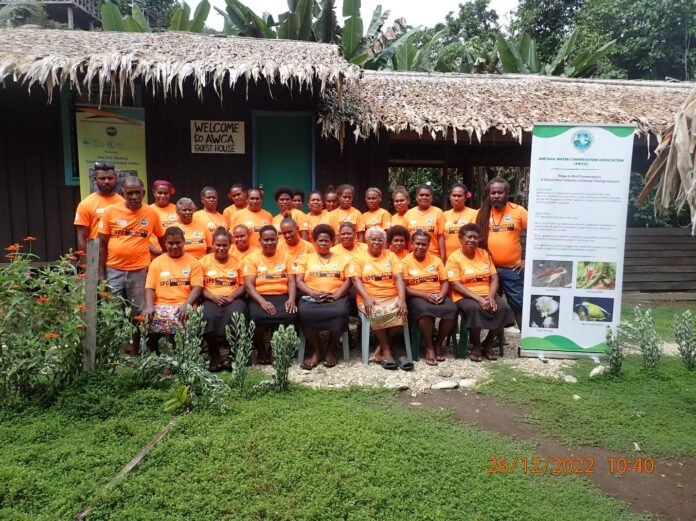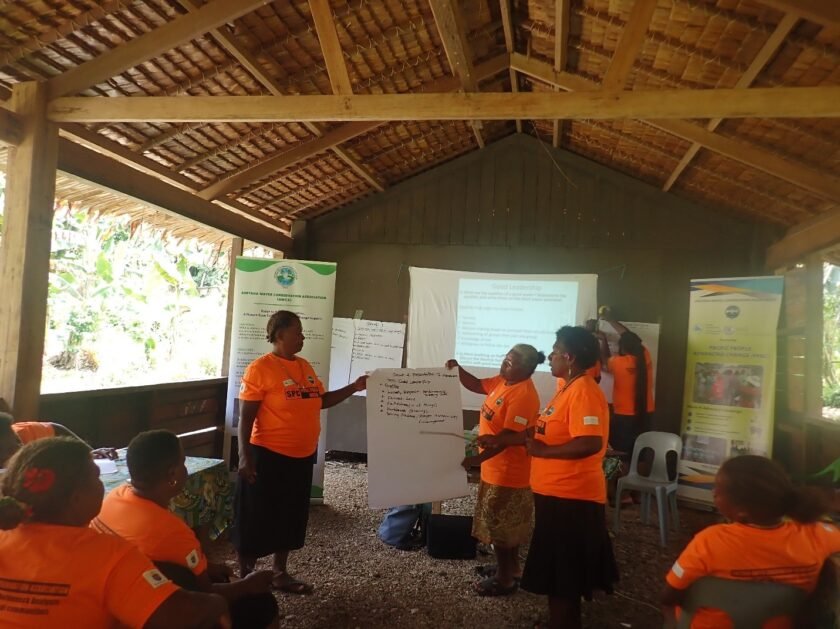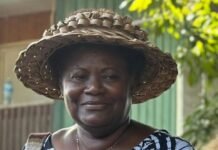

BY JOHN HOUANIHAU
THE Ahetaha Water Conservation successfully completed training on Village and Community WASH Bottleneck Analysis Manual for 12 communities from 26th to 27th December 2022.
About 27 participants or representatives from Foulofo, Waima’aka, Kanata, Moosi, Su’u, Manawai, Ahetaha, Raeao, Nariaoa, Anopo’u, Airoke and Aarahau attended the two days training.
The project seeks to address the burden of having BottleNeck (BN) and barriers to basic WASH facilities in the rural villages of the Solomon Islands.
The project seeks to empower rural women to gain skills and knowledge to enable them to carry out BottleNeck Analysis (BNA) baseline findings around four communities to identify data to support the WASH Project proposal application to reduce family poor hygiene and other family WASH needs in the communities.


Therefore, AWCA identifies that there are women who can take the lead and the initiative to bring about change in their communities.
With the right direction and motivation, these women themselves can bring about the changes that communities and societies wish to see in the households and eventually the community.
The two days training was carried out by AWCA Mentor in partnership with local facilitators.
The main facilitators of the training are; Clifton To’otalau, James Singi and Peter Kenieroa.
The supporting topics covered during the training include, Good Leadership and Governance, Developing a good mindset, and how to conduct a meeting that works in the community.
This manual will provide a summary of WASH Bottleneck Analysis baseline findings for communities in Ward 19 AIAISI.
The key target audience for this report is the community leadership of the AIAISI ward, Aiaisi Ward Development Committee (WDC), East Are’Are Constituency office and AWCA for reporting and project proposal purposes.
A copy of the report is to be shared with the leadership of communities taking part in the survey.
This WASH Bottleneck Analysis has five main components and for this project activity it is referred to as “Standards”.
Standard 1 is the Village WASH Management – This means that each village will have a system for managing WASH development and maintenance.
Standard 2 is Sanitation – sanitation should be seen as; Sufficient, Accessible, Private, Clean, Secure and culturally have appropriate toilets provided for all women and girls.
Standard 3 is the Water supply – Sufficient water is available at all times for drinking, food preparation, personal hygiene, cleaning and laundry, and is safe for the purpose intended.
Standard 4 is the Water facilities & access – sufficient water collection points and water use facilities are available in the community to allow convenient access to, and use of water for drinking, food preparation, personal hygiene, cleaning and laundry.
Standard 5 is the correct use and maintenance of water supply and sanitation facilities which is ensured through sustained hygiene promotion.
The communities of Aiaisi ward 19 should see and use WASH facilities as resources for improved hygiene behaviours.
Lelebet Gud and Green-means Barava Gud and this shows that it meets healthy and national WASH standards.


The campaign objective is to train rural communities, particularly women and girls to proactively implement WASH BNA in eight selected villages and to raise awareness of the barriers and WASH BNA for Ahetaha community members residing around Manawai Harbour.
This campaign is well aligned with the key message “Promoting rural women and girls to take lead in WASH Bottle Neck Analysis (BNA) survey in Aiaisi ward 19”.
The WASH Bottleneck Analysis training manual was designed by Ahetaha Water Conservation founder and Mentor Mr Eddie Haikau Huitarau.
According to Eddie Haikau Huitarau, AWCA founder and Mentor, the training is an activity of a project funded by SPC through PPAC Phase five and AWCA is a grantee to seek and address the burden of having BottleNeck and barriers with basic WASH facilities in the rural village settings in the Solomon Islands.
“We are at least trying to give to ward 19 and East Are’Are Constituency in whatever resources that are available to us.
“Thus, let’s identify the issues and the needs of EAC and rank them into priorities with evidence to convince potential funder,’’ he said.











































